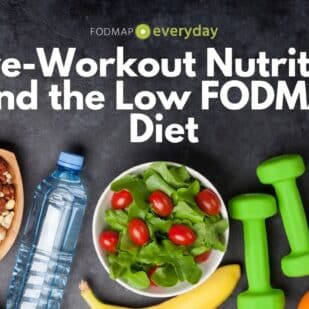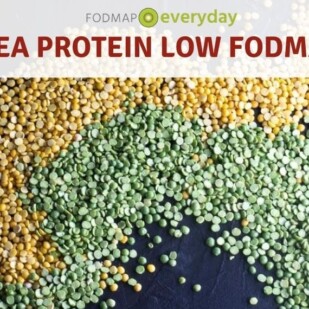Post-workout nutrition is key, and we have specific suggestions for those following the low FODMAP diet.
If you’re an active individual who dedicates your time to training and structured workouts, something tells me you likely want to reap the benefits of your training by gaining strength, speed and performance improvements over time.
Pre-Workout & Post-Workout Nutrition: Take A Look At Both
Be sure to read our companion article Pre-Workout Nutrition and The Low FODMAP Diet article as well. And if you are a performance athlete with IBS we have an article specifically focused on the unique nutritional requirements for you titled How To Fuel When You Have IBS: All About Low FODMAP Sport Gels, Sport Drinks & Snacks
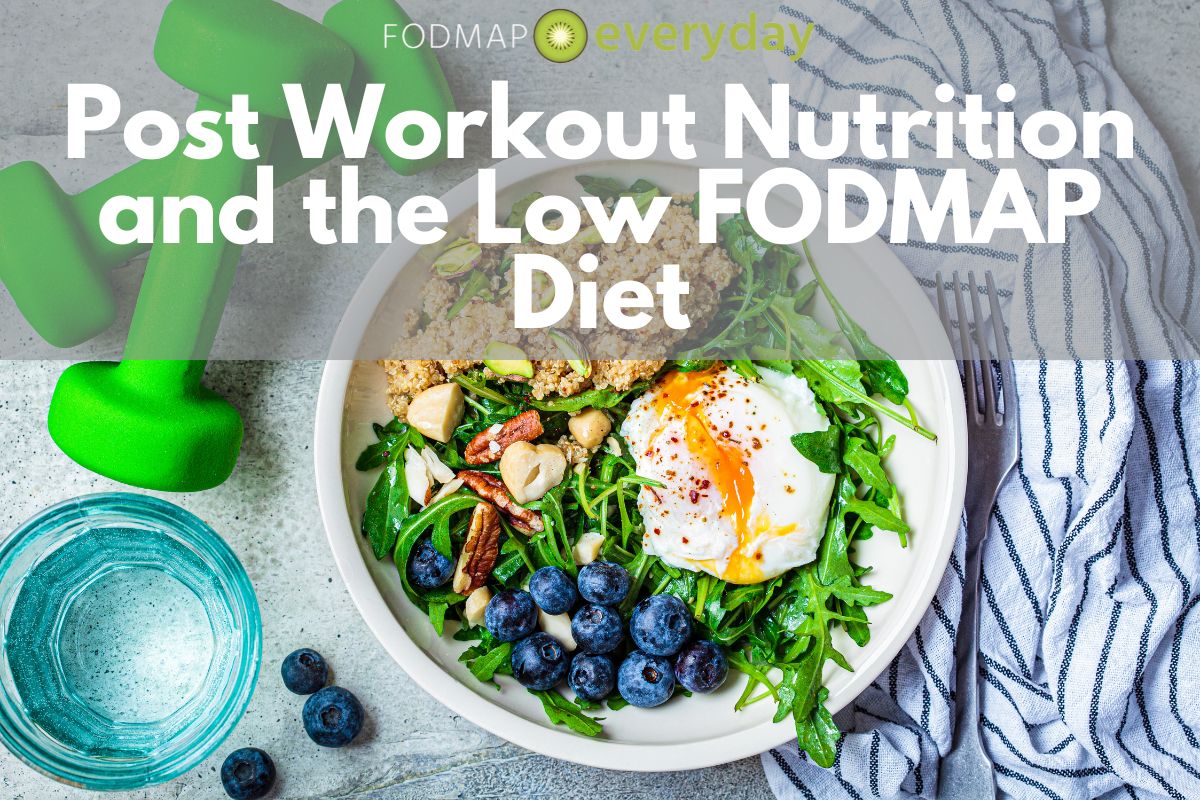
Did you know that nutrition is essential for seeing progress with moderate-high intensity training? Yes, that’s right – your muscles need the proper fuel to recover, repair and come back stronger each time you train! Moderate – high intensity training helps to support heart health, strengthen bones and joints, and build muscle, which can help support our energy and metabolic health. This includes activities like resistance and strength training, dancing, running, swimming, high intensity interval training (HIIT), CrossFit and aerobics.
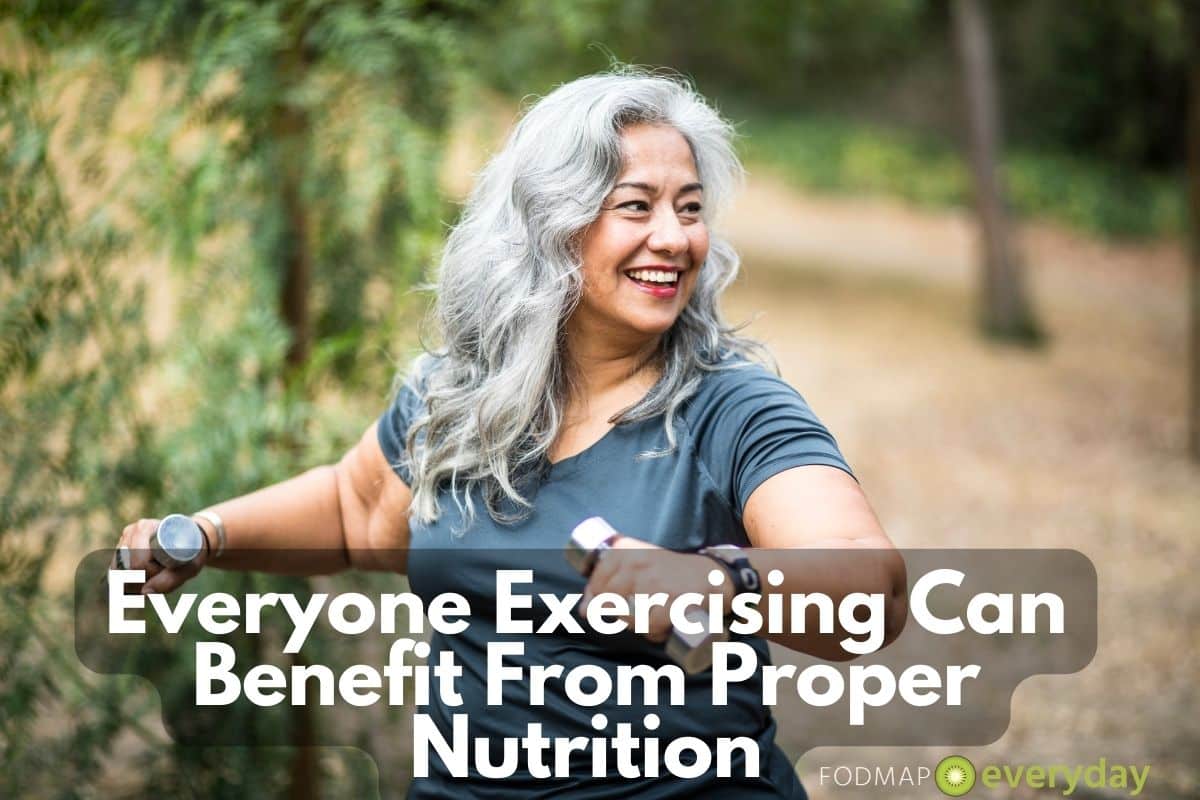
Everyone Exercising Can Benefit From Proper Nutrition
But even if you’re exercising mainly for health reasons and not too concerned about strength or performance, you would like to also minimize the amount of time you feel sore after a workout. Not to mention, it goes without saying that engaging in regular exercise has a plethora of benefits – cognitive function, improving our sleep, resilience to stress, bone health, heart health and managing our weight.
This article is for the active individual with irritable bowel syndrome (IBS) looking to maximize their gains and recovery in the gym, as well as supporting their consistency with regular exercise, by supporting their body with the proper nutrition.
Why is Recovery Nutrition Important?
One of the main goals of recovery nutrition is to refuel the body’s glycogen stores. Moderate to high intensity workouts including endurance and resistance training rely primarily on carbohydrates, specifically the carbohydrates stored in our muscle and liver cells known as glycogen (1). During exercise, we use these up, and once they’re gone, we feel fatigued and can no longer carry on!
So for most of you training less than 1.5 hours at moderate-high intensity, you should likely have enough glycogen to get you through the workout and not require intra-workout carbs to help top up your carb fuel (aka you don’t need to eat during your workout if it’s less than this time). But the goal at the end of the workout is to replace glycogen stores ASAP – so that you can prime your muscles to take on the next workout as efficiently as possible! (1).
In addition, we can help muscle protein synthesis by providing our body with carbs and amino acids, so that our muscles can begin to repair and rebuild (which is a good thing). When we have protein in the right amount and timing for our activities, this can further optimize this process.
Fluid Intake Counts
In addition to this, we want to replace fluid losses (aka sweat), to further help our muscles recover as well as stay hydrated (because we all know that is super important for energy, mental clarity, and yup – happy bowels!)
So for one, by properly re-fueling we will be able to more accurately tackle multiple sessions in a day, or multiple training days, rather than requiring extra rest days. Of course, for those just getting started with training, it is important to have adequate rest days and slowly build up your volume and intensity of training (and we advise you to check with your medical team before starting a new exercise regime). But for those who are fairly active and want to see greater advancements, recovery nutrition is key!
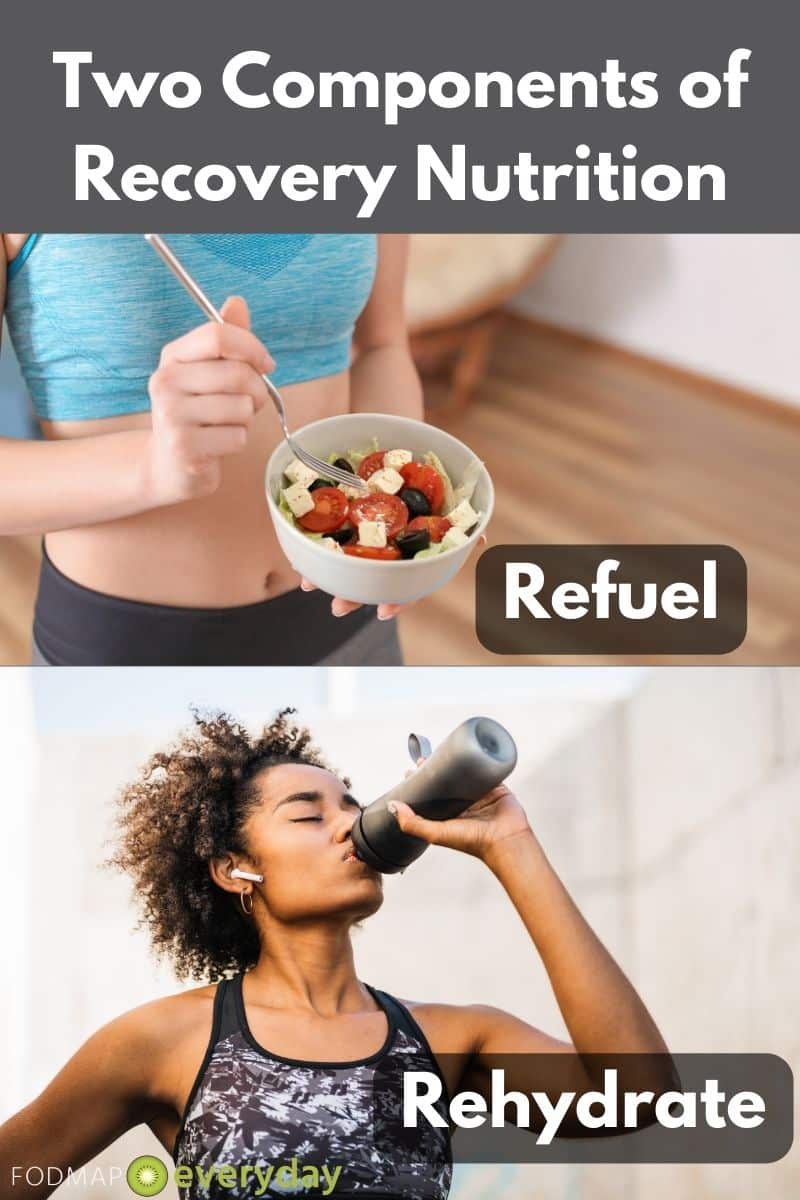
Two Components of Post-Workout Recovery Nutrition
In simple terms, recovery nutrition is a meal, snack and/or beverage consumed shortly after a workout.
There are two important components of your recovery nutrition: Refuel and Rehydrate!
Let’s get into them.
Refuel
There are two main things to consider with post-workout fuel: content, and timing.
Content of Recovery Nutrition
Carbs
An ideal recovery snack should contain – yup, you guessed it – carbohydrates ! And, since carbs are FODMAPs, we have to choose wisely. As mentioned, we need carbohydrates to replace the glycogen stores lost during moderate-high intensity activities. Foods like rice, quinoa, low FODMAP toast, bananas (firm), oatmeal, pasta (corn, rice, quinoa) and potatoes are great low FODMAP sources of post-workout carbohydrates.
An ideal recovery snack should contain – yup, you guessed it – carbohydrates ! And, since carbs are FODMAPs, we have to choose wisely.
Based on guidelines, we want to aim for 1.0 – 1.2 grams of carbohydrates per kg of body weight in the 4-6 hours post training (2).
Protein
We also want to include protein in our post workout fuel to help support muscle recovery. Sources of high quality protein include firm tofu, tempeh, protein powder isolates (brown rice, collagen, pea), greek yogurt (lactose-free), cottage cheese (lactose-free), fish, and shellfish.
Based on studies, it has been shown that ingesting high quality protein in the early recovery phase (0-2 hours after training), with amounts of approx. 0.2 – 0.35 grams per kilogram of body weight (15 – 25g for the average person) can enhance muscle protein synthesis (2).
Limit Fat & Fiber
Similar to our pre-workout fuel (review in our article here), we want this post-workout fuel to be lower in fat and fiber (less than 10g each). This is for a slightly different reason – as these nutrients tend to slow gut motility (aka speed that food moves through our gut), we want to limit them in order to allow our body to more quickly digest the protein and carbohydrates and put them to use quickly to help our muscles refuel!
This means limiting skins on vegetables and opting for pureed/cooked veggies, and limiting foods like egg yolks, nut butters, nuts, avocado, in our post workout fuel.
Antioxidants
It is also important to include some antioxidants in this fuel. Exercise causes a natural type of stress on your cells, known as ‘oxidative stress’. Depending on the level of intensity, your cells can increase in this inflammation post workout. As athletes and active individuals have higher antioxidant needs, we want to ensure we include these in our post workout fuel. Great sources include colorful fruits and vegetables (strawberries, kale, spinach, purple cabbage, blueberries, kiwi), turmeric powder, and lemon/lime juice.
Low FODMAP Recovery Meal Examples:
- Greek yogurt (lactose-free) + medium firm banana (100g) + cooked quinoa + tsp (4g) chia seeds
- Low FODMAP protein powder + 1 cup cooked oatmeal + ¼ cup (40g) blueberries + side low FODMAP gluten-free toast with tsp natural peanut butter
- Grilled chicken breast + ½ cup (75g) cooked sweet potato + 1 cup (50g) baby spinach with squeeze lemon juice and 1 tsp olive oil
- Salmon + brown rice + 15 cooked green beans (75g)
- Recovery smoothie: greek yogurt (lactose-free) or low FODMAP protein powder + 5 medium (65g) strawberries + 1 cup (50g) baby spinach + medium firm banana (100g) + squeeze lemon juice
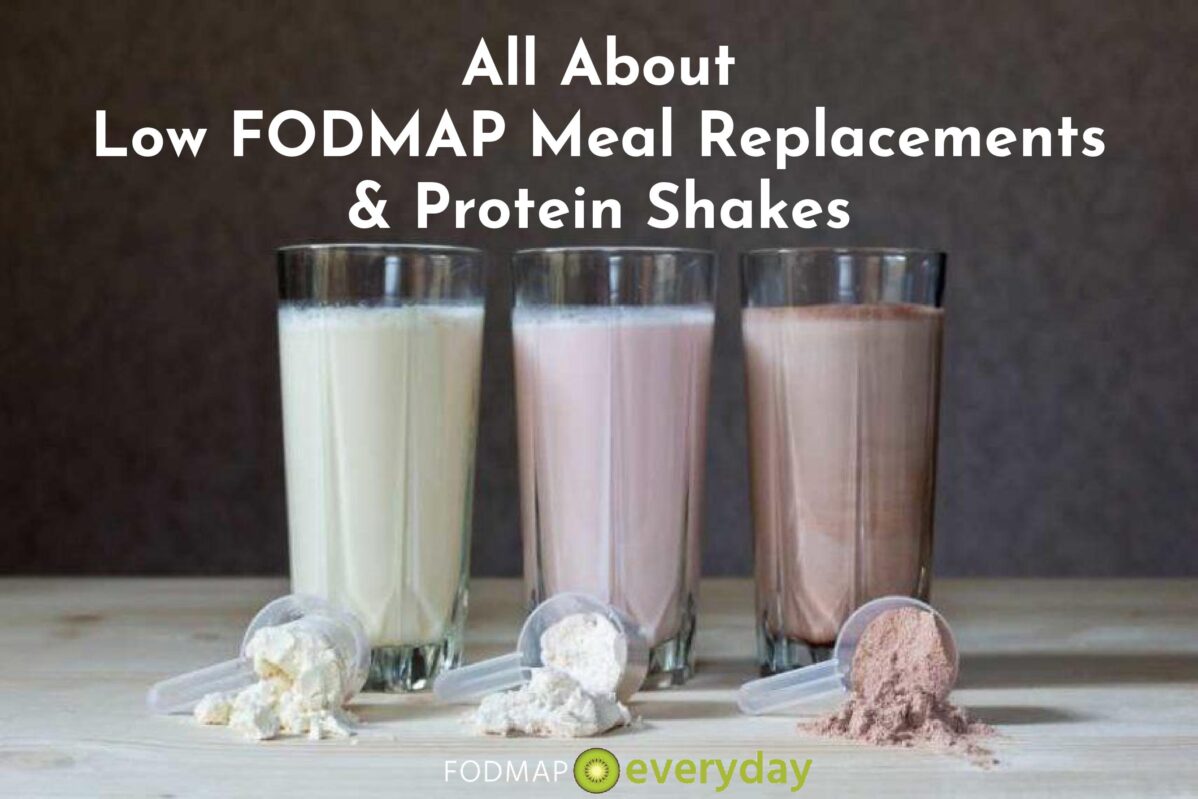
You May Want To Read: All About Low FODMAP Meal Replacements and Protein Shakes
Timing of Recovery Nutrition
In regards to timing, this can depend on a few factors.
If you’ve had a snack or fuel with protein and carbs shortly before your training session (1-1.5 hours before), you can be more lenient with your recovery window and aim to eat within 2 hours post workouts.
If it’s been greater than 2 hours, and/or you’ve trained fasted (ie. you’re in the elite group of early morning gym-goers!) aim to consume your post-workout fuel within 1 hours of completing your workout (1).
However, depending on your timing, you might not be able to have a meal right away and are better suited to have a recovery snack. What we would recommend in this case is to have a simple snack with protein and carbs within 1-hour of finishing your training, and then aim to have your regular meal with carbs, protein and fats 2-3 hours later.
Examples of this quick recovery snack could be:
- Low FODMAP protein powder + firm banana (100g) + 1 cup unsweetened almond milk
- Low FODMAP energy bar + boiled egg
- Instant oats (23g, dry) + fat free, lactose-free cottage cheese (175g)
Rehydrate
Guess what? Adequate recovery is not just about food! Rehydrating your body is equally as important. In addition to replacing the daily fluids we lose in the form of pee, poop, respiration, and sweat, we also need to replace fluids lost by sweating during our workouts, which can be further exacerbated based on our environmental losses (2).
During moderate-high intensity you will be losing both fluids and electrolytes (minerals that help our body maintain fluid balance). So it is incredibly important that you replenish those losses. If you’re wondering about proper hydration before your workouts (which is also important!) we have an article for you.
A general rule of thumb is to have 1L of fluids per every 50 lb body weight each day, and then add an additional 250-500ml per every 30-minutes activity. This extra fluid can be consumed during your workout, as well as upon finishing. Although an estimate, another way to ensure you’re probably rehydrating is to continue to steadily drink water until you pee clear after your workout.
A general rule of thumb is to have 1L of fluids per every 50 lb body weight each day, and then add an additional 250-500ml per every 30-minutes activity.
Going a little deeper – Typically, the best way for an athlete to replace fluid losses would be to weigh themselves before and after their training. Based on the weight lost from fluids during training, they should aim to drink 1.2 – 1.5L of fluid for every 1kg lost (2). However, we recognize this isn’t so realistic for the recreational athlete, so you can follow our general guidelines above.
You may need a sports drink or electrolyte supplement to replace losses if the following conditions apply which could increase your sweat rate:
- Training in hot heat (ie. outside in the summer)
- >45-minutes high intensity exercise
- You tend to lose a lot of sweat
- Wearing heavy gear (hockey)
Most recreational athletes tend to over hydrate on simply water, but forget to replenish electrolyte losses (which is important for fluid balance) so don’t skip this part if these conditions apply (2)!
Some electrolyte options we recommend include:
- Vega Sport Hydrator: Note: This product has not been tested in lab for FODMAP content. However it contains 0 grams of sugars per serving and although it contains beet root powder which is high FODMAP, this is far down the list in terms of ingredients so based on the product serving size (3.6g) we can assume it should be tolerated by those with IBS. However, always assess your own tolerance level with untested products.
- LMNT Electrolyte Powder

The Bigger Picture: Your Daily Nutrition
It’s important to consider that your nutrition on a daily basis lays the overall foundation for your training recovery and performance. Although we can optimize our training improvements by what we eat in the recovery phase of our workout, meeting our daily nutrition needs as a whole is of the utmost importance.
If you aren’t sure if you’re getting enough macros (protein, carbs), calories/energy and/or vitamins and minerals on a daily basis to meet your activity levels and goals, make sure to reach out to a Dietitian to help you create a plan to build meals and meet your daily goals to truly make the most of your workouts.
Additional Considerations for IBS & Activity
For some, high intensity activity can be a trigger for gut symptoms. This fascinating connection is due to the vagus nerve and the raise in cortisol levels. I’ve had runners who are able to tolerate certain meals well when relaxed, but if they eat them directly after a long run – they get the cramps!

You May Want To Read: How to Avoid Gastrointestinal Issues During Exercise
My suggestion for this would be to try some deep breathing exercises, such as square breathing or diaphragmatic breathing once you’ve completed your activities (and don’t forget to stretch!). Then once you feel calmer, go and have your post workout fuel.
More Support
As always, reach out to a registered dietitian for support with fuelling your performance as well as managing IBS. Check out our Global Registered Dietitian Directory. Ready to fuel your workouts and sports performance, while keeping IBS and gut symptoms at bay with the right tools and strategies? My Pre & Post Workout Nutrition For a Happy Gut: Mini Course & Resource Bundle might be the next step for you! Use code FODMAPEVERYDAY for 15% off the usual price.
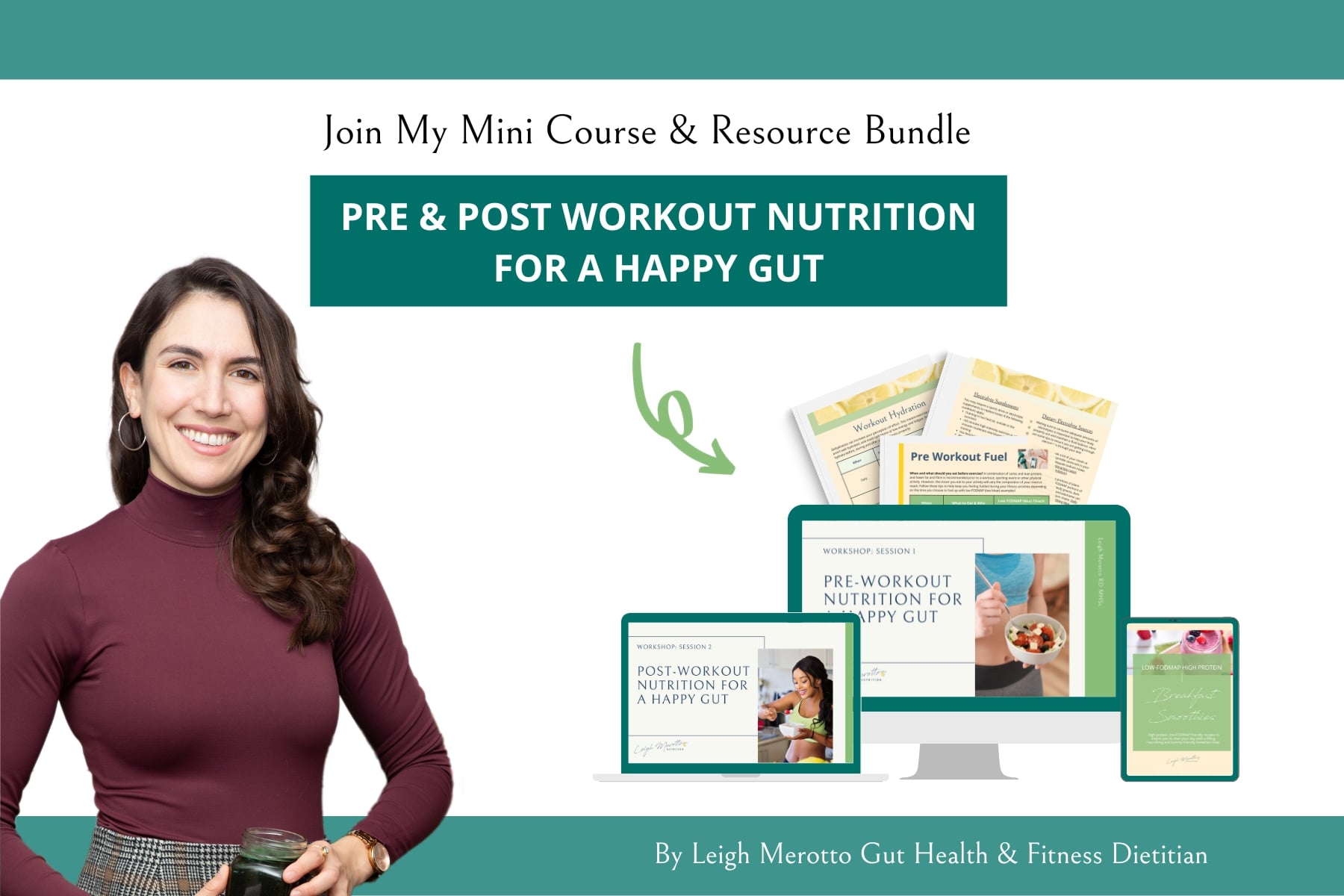
The Takeaway
As you can see, there are some things you can do to optimize your recovery from training and support your ability to come back stronger. While it is beneficial to stay active for IBS as it helps reduce stress, keeps our bowels moving and can help reduce gas clearance, if you’re looking to gain muscle and support strength, taking it a step further by optimizing your post workout nutrition is important.
Want to learn more about pre-workout nutrition? Please read my companion article, Pre-Workout Nutrition and the Low FODMAP Diet
References:
1. Kerksick, C.M., Arent, S., Schoenfeld, B.J. et al. International society of sports nutrition position stand: nutrient timing. J Int Soc Sports Nutr 14, 33 (2017). https://doi.org/10.1186/s12970-017-0189-42.
2. Thomas, D. T., Erdman, K. A., & Burke, L. M. (2016). Position of the academy of nutrition and dietetics, Dietitians of Canada, and the american college of sports medicine: Nutrition and athletic performance. Journal of the Academy of Nutrition and Dietetics, 116(3), 501-528. doi:10.1016/j.jand.2015.12.006
